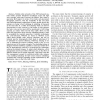Free Online Productivity Tools
i2Speak
i2Symbol
i2OCR
iTex2Img
iWeb2Print
iWeb2Shot
i2Type
iPdf2Split
iPdf2Merge
i2Bopomofo
i2Arabic
i2Style
i2Image
i2PDF
iLatex2Rtf
Sci2ools
118
click to vote
VTC
2010
IEEE
2010
IEEE
QoS and Flow Management for Future Multi-Hop Mobile Radio Networks
Abstract— Mobile radio networks of the IMT-Advanced systems family promise ubiquitous broadband access and high area coverage, with rates of several 100 MBit/s. They claim to guarantee QoS support in terms of low delay and guaranteed throughput. However, with the availability of flat rate plans and bandwidth-hungry applications of future mobile devices the systems are facing a hard challenge in satisfying all demands at the same time in a traffic load situation which can best be characterized as total overload or full buffer. In this situation the basic voice service must still be operational to full Erlang capacity, no matter what load the data traffic offers. In this paper the hierarchical static priority scheduling scheme is used to accomplish the required separation. Candidate technologies like LTE-Advanced, WiMAX are based on OFDMA access which allows flexible radio resource allocation, but has an inherent near-far heterogeneity which leads to unfairness if it is optimized f...
| Added | 31 Jan 2011 |
| Updated | 31 Jan 2011 |
| Type | Journal |
| Year | 2010 |
| Where | VTC |
| Authors | Rainer Schoenen, Arif Otyakmaz |
Comments (0)

